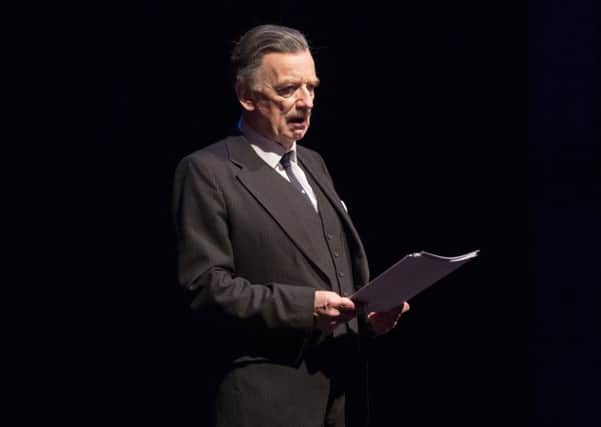Theatre review: What Shadows at the Royal Lyceum, Edinburgh


What Shadows ***
Royal Lyceum, Edinburgh
Yet despite a truly brilliant central performance from the great Ian McDiarmid as Powell, What Shadows often seems too diffuse in focus to do full justice to its vital subject, and more like a primer for a possible debate on English identity than an actual drama about it. Set in two time-frames - in 1968 and 1992, a few years before Powell’s death - the play surrounds Powell with a series of characters who challenge him in various ways.
So there’s his Quaker journalist friend Clem Jones, who, with his wife Marjorie, breaks with Powell over the Birmingham speech. There are two female academics, one young, ambitious, angry and black, the other exiled from Oxford after suggesting that some of Powell’s arguments have never been fully answered. There’s the racist old lady whom Powell quoted in his speech; there are her friendly Asian neighbours. And just here and there - in Powell’s final conversations with Clem and with the young academic, Rose - there is the glimpse of a serious dialogue about why his romantic and nostalgic idea of England was wrong, and always bound to fail.
Advertisement
Hide AdYet none of this is argued out thoroughly enough to offer any real sense of dynamism, in a play that sometimes seems to be about the substance of English identity, empire and citizenship, sometimes about the idea of identity itself (does it necessarily entail prejudice and hatred?), and sometimes about where we draw the line, in exchanging views with those whose ideas we believe to be utterly wrong. Any one of these themes would have made a powerful play, and perhaps a great one, for this Brexit moment in British history. In the end, though, Hannan and his director Roxana Silbert choose to give us all and none of them. Instead, they lay all these elements before us, in long dialogue scenes of very variable quality and credibility; and then - in a decision that perhaps inevitably skews the play towards its charismatic and brilliantly portrayed central character - they leave us to make of them what we will.
*Until 23 September